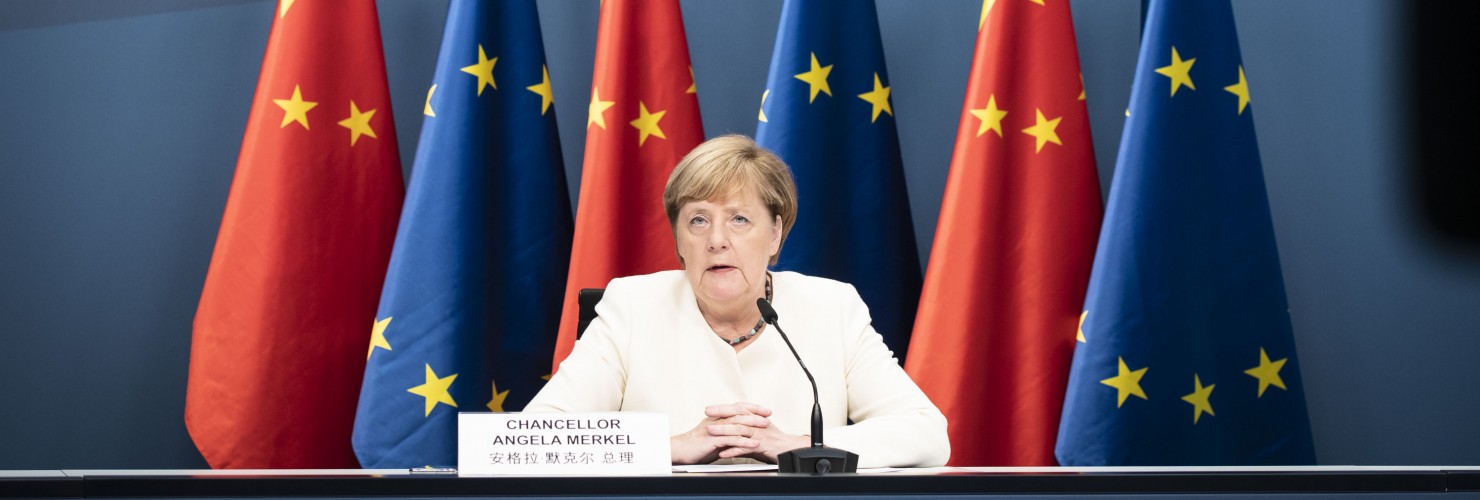

Germany's Next China Policy
With the era Merkel coming to an end, Germany’s China policy seems set for change. Lawmakers of major parties appear poised for a revision of the current government’s economic pragmatism, says Barbara Pongratz.
German Chancellor Angela Merkel will step down after the national election in September and in the mid-term, almost certainly force the European Union’s largest member state to revise its pragmatic and pro-business approach to China. As the coalition between Merkel’s center-right Christian Democrats (CDU/CSU) and the center-left Social Democrats (SPD) is expected to end, current polls suggest a government of Greens and Christian Democrats, or a Greens-led coalition with Social Democrats and liberal (in the European sense) Free Democrats (FDP).
Greens and Free Democrats have in opposition criticized Merkel's prioritization of economic issues in relations with China. But it remains an open question how hard they would push for a harder line on human rights and the rule of law if one or both joined the next government. There are currently heated debates about how to navigate Germany's China policy at a time when partnership with the United States could also regain momentum. Major parties seem to be trying to find a middle way in their positioning. It is evident, however, that they are set on revising the current administration’s political course on key issues.
Huawei’s role in Germany’s 5G rollout
Unlike other European capitals, Berlin has made no final decision about Huawei’s role in Germany’s new mobile-phone networks. Social Democrats and the Christian Democrat Chairman of the Bundestag Committee on Foreign Affairs, Norbert Röttgen, have called for the company’s exclusion. But this vast majority of CDU/CSU lawmakers has refused to fall into line, implicitly accepting Merkel’s pragmatically silent pro-business line. The opposition Greens and Liberal Democrats in 2019 spoke out against including Huawei. “Europe should follow Australia’s example” and exclude it, Greens Co-Chairperson Robert Habeck said.
China’s abuses of human rights and minorities
As more details of China’s human rights violations in Xinjiang surfaced, the Social Democrats’ Bärbel Kofler pointed to the “catastrophic situation” in Xinjiang. Also the Merkel government’s human-rights representative, she bemoaned that human-rights in Xinjiang always get a low priority on the diplomatic agenda. Opposition human rights advocates – namely Margarete Bause (Greens) and Gyde Jensen (FDP) – called on the government to take a tougher line. Bause demanded “actions need to follow words” and called for imposing EU sanctions on the Xinjiang Communist Party secretary and other party officials well before the EU did so in March.
National security law for Hong Kong
German lawmakers from all parties last summer pleaded for a more decisive government response to China's draconian moves in Hong Kong. CDU foreign-policy expert Röttgen pointed out Germany’s reaction was too lax and a dangerous signal to China that it could continue on such a course. The SPD’s Nils Schmid demanded that "Germany should generously grant Hong Kong citizens settlement rights". However, Schmid distanced himself from the most extreme position in the Hong Kong issue, which was taken by the opposition FDP’s Jensen. She called for imposing sanctions on China and even the cancellation of the high-level EU-China summit to effectively halt diplomatic dialogue. In doing so, she questioned a keystone of German China policy – that engagement is preferable to disengagement. The Greens were the first to call for Germany to put on hold the extradition treaty with Hong Kong, which the Merkel government then did at the end of July 2020.
Education cooperation with China
Chancellor Merkel late 2019 expressed her support for a Northern German Confucius Institute (CI). But skepticism about CIs seems to prevail in most parties. Calling the CIs a "propaganda tool" of the Chinese government, an SPD member of the Bavarian state parliament managed to kick off a critical discussion at committee level in Munich. In the Bundestag, the opposition FDP in March submitted a proposal to end cooperation between CIs and German universities to “protect freedom of research and education”. Three of 19 German universities have stopped cooperating with CIs, although unlike in other European countries the institutes remain open for the time being.
Comprehensive Agreement on Investment (CAI)
A SPD member of the EU parliament described the CAI as a “first ever” EU break through on rule setting with China. CDU/CSU lawmakers in the Bundestag “welcomed” the conclusion-in-principle, but Merkel also faced criticism. Foreign policy expert Röttgen called the agreement’s clauses on forced labor “alarming” as the EU had concluded “a treaty in which forced labor is implicitly accepted." The opposition FDP and Greens expressed concerns that CAI would give China more influence in the EU and that it was a “kick in the shins” for the US just as the Biden administration took office. Given the EU Parliament still has to ratify the CAI and the recent deterioration of EU-China relations after the mutual imposition of sanctions in March, it is unclear whether the CAI will ever actually come into force.
Revive partnership with the US and align China policy
Merkel’s push for the conclusion in principle of CAI contradicted the thrust of the CDU/CSU position paper published shortly after US President Joe Biden took office. The paper emphasized the need for “a common and determined [transatlantic] China policy in the competition of systems.” Most German parties favor revived cooperation with the US to defend human rights and democratic values. But ruling and opposition parties don’t seem to agree on how close the alignment should be on other issues such as economic policy coordination or issues of strategic interest. The Greens’ Jürgen Trittin is in favor of “case by case alliances” with the US and China – an echo of the EU’s strategic outlook of March 2019, which called China a “partner, competitor and rival.”
A new course for the next government
Chancellor Merkel's long-term approach to China policy has come to prioritize smooth economic relations over defending values – a stance not only criticized by opposition politicians. In heated debates, major parties are currently trying to find a middle way in their positioning on US rapprochement and China policy. As for the latter, a look at the above key issues indeed suggests that they are set on revising chancellor Merkel’s political course.


